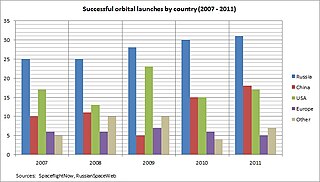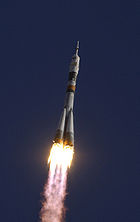
The Soyuz programme is a human spaceflight programme initiated by the Soviet Union in the early 1960s. The Soyuz spacecraft was originally part of a Moon landing project intended to put a Soviet cosmonaut on the Moon. It was the third Soviet human spaceflight programme after the Vostok (1961–1963) and Voskhod (1964–1965) programmes.

Soyuz is a family of expendable Russian and Soviet carrier rockets developed by OKB-1 and manufactured by Progress Rocket Space Centre in Samara, Russia. The Soyuz is the rocket with the most launches in the history of spaceflight.

The Progress is a Russian expendable cargo spacecraft. Its purpose is to deliver the supplies needed to sustain a human presence in orbit. While it does not carry a crew, it can be boarded by astronauts when docked to a space station, hence it is classified as crewed by its manufacturer. Progress is derived from the crewed Soyuz spacecraft and launches on the same launch vehicle, a Soyuz rocket.

The Soyuz-U launch vehicle was an improved version of the original Soyuz rocket. Soyuz-U was part of the R-7 family of rockets based on the R-7 Semyorka missile. Members of this rocket family were designed by the TsSKB design bureau and constructed at the Progress factory in Samara, Russia. The first Soyuz-U flight took place on 18 May 1973, carrying as its payload Kosmos 559, a Zenit military surveillance satellite. The final flight of a Soyuz-U rocket took place on 22 February 2017, carrying Progress MS-05 to the International Space Station.

Soyuz-2 is a modernised version of the Soviet Soyuz rocket. In its basic form, it is a three-stage launch vehicle for placing payloads into low Earth orbit. Compared to the previous versions of the Soyuz, the first-stage boosters and two core stages feature uprated engines with improved injection systems. Digital flight control and telemetry systems allow the rocket to be launched from a fixed launch platform, whereas the launch platforms for earlier Soyuz rockets had to be rotated as the rocket could not perform a roll to change its heading in flight.

The Progress Rocket Space Centre, formerly known as TsSKB-Progress, is a Russian joint-stock company under the jurisdiction of Roscosmos State Corporation responsible for space science and aerospace research. It was the developer of the famous Soyuz-FG rocket that was used for crewed space flight, as well as the Soyuz-U that was used for launching uncrewed probes.
The Soyuz-U2 was a Soviet, later Russian, carrier rocket. It was derived from the Soyuz-U, and a member of the R-7 family of rockets. It featured increased performance compared with the baseline Soyuz-U, due to the use of syntin propellant, as opposed to RP-1 paraffin, used on the Soyuz-U.

The year 2011 saw a number of significant events in spaceflight, including the retirement of NASA's Space Shuttle after its final flight in July 2011, and the launch of China's first space station module, Tiangong-1, in September. A total of 84 orbital launches were conducted over the course of the year, of which 78 were successful. Russia, China and the United States conducted the majority of the year's orbital launches, with 35, 19 and 18 launches respectively; 2011 marked the first year that China conducted more successful launches than the United States. Seven crewed missions were launched into orbit during 2011, carrying a total of 28 astronauts to the International Space Station. Additionally, the Zenit-3F and Long March 2F/G carrier rockets made their maiden flights in 2011, while the Delta II Heavy made its last.

Russia's space industry comprises more than 100 companies and employs 250,000 people. Most of the companies are descendants of Soviet design bureaux and state production companies. The industry entered a deep crisis following the dissolution of the Soviet Union, with its fullest effect occurring in the last years of the 1990s. Funding of the space program declined by 80% and the industry lost a large part of its work force before recovery began in the early 2000s. Many companies survived by creating joint-ventures with foreign firms and marketing their products abroad.

Progress-M1 (Russian: Прогресс-М1, GRAU indices 11F615A55 and 11F615A70), also known as Progress 7K-TGM1, is a Russian spacecraft which is used to resupply space stations. It is a variant of the Progress spacecraft, derived from the Progress-M, but modified to carry more UDMH and N2O4 propellant for refuelling the International Space Station instead of other cargoes such as water. A Progress M1 11F615A55 spacecraft could carry up to 1,700 kilograms (3,700 lb) of propellant in eight mid-section refuelling tanks, compared to the 850 kilograms (1,870 lb) that a Progress-M of the same generation could carry. This propellant can be transferred to the Space Station's own propulsion system through fluid connectors in the docking ring, or it can alternatively be used by the Progress' thrusters to boost the station altitude or to change its orientation, or attitude, in space. In addition to propellant, the spacecraft can also carry up to 1,800 kilograms (4,000 lb) (6 cubic meters volume) of supplies in its forward pressurized cargo module (including a maximum of 40 kilograms (88 lb) of compressed air), but the combination of pressurized cargo and refuelling propellant cannot exceed 2,500 kilograms (5,500 lb) or the maximum capability of the launch vehicle. The tare weight of Progress-M1 is 5,050 kilograms (11,130 lb). Its KTDU-80 engine has a thrust of 2,950 newtons (660 lbf) and uses up to 892 kilograms (1,967 lb) of propellant carried in four integrated spherical tanks for maneuvers such as docking and deorbiting the craft; 185 kilograms (408 lb) to 250 kilograms (550 lb) is typically left unused and hence available for the space station.

In 2015, the maiden spaceflights of the Chinese Long March 6 and Long March 11 launch vehicles took place.

In 2014, the maiden flight of the Angara A5, Antares 120 and Antares 130 took place.

This article documents notable spaceflight events during the year 2019.
Meridian 5, also known as Meridian No.15L, was a communications satellite launched by the Russian Federal Space Agency which was lost in a launch failure in December 2011. The fifth Meridian spacecraft to be launched, Meridian 5 was to have been deployed into a Molniya orbit with an apogee of 39,000 kilometres (24,000 mi), a perigee of 900 kilometres (560 mi) and 65 degrees of orbital inclination; from which it would have provided communications for the Russian military. It would have been operated by the newly formed Russian Aerospace Defence Forces.
Aist 1 is a Russian technology demonstration satellite which was launched in December 2013. Aist 1 is operated by the Samara Aerospace University, who constructed it in partnership with TsSKB Progress. It is the second launched Aist satellite, following Aist 2's April 2013 launch.

Kosmos 2501, also known as Glonass-K1 No.12L is a Russian navigation satellite which was launched in 2014. The second Glonass-K satellite to be launched, it is the second of two Glonass-K1 spacecraft which will serve as prototypes for the operational Glonass-K2 spacecraft.

Progress MS-01, identified by NASA as Progress 62P was a Progress spaceflight operated by Roscosmos to resupply the International Space Station (ISS) in 2015. It was launched on 21 December 2015, to deliver cargo to the ISS. Progress MS-01 is the first vehicle in the Progress-MS series.

Progress MS-10, identified by NASA as Progress 71P, was a Progress spaceflight operated by Roscosmos to resupply the International Space Station (ISS). This was the 162nd flight of a Progress spacecraft.

Progress MS-14, Russian production No.448, identified by NASA as Progress 75P, was a Progress spaceflight operated by Roscosmos to resupply the International Space Station (ISS). This was the 166th flight of a Progress spacecraft.


















